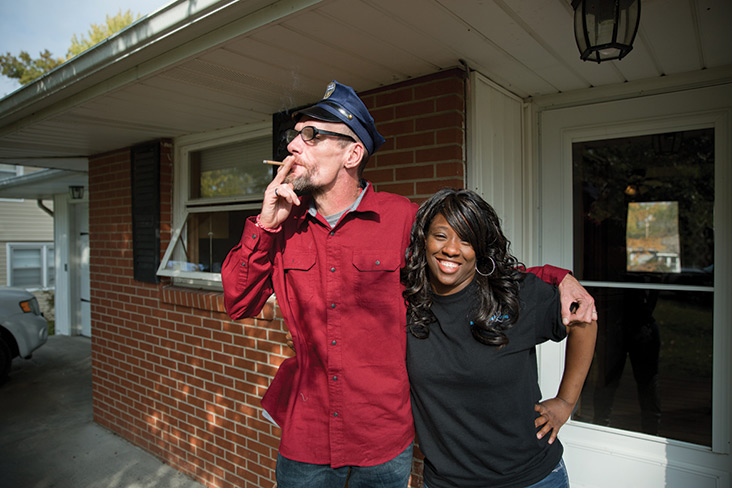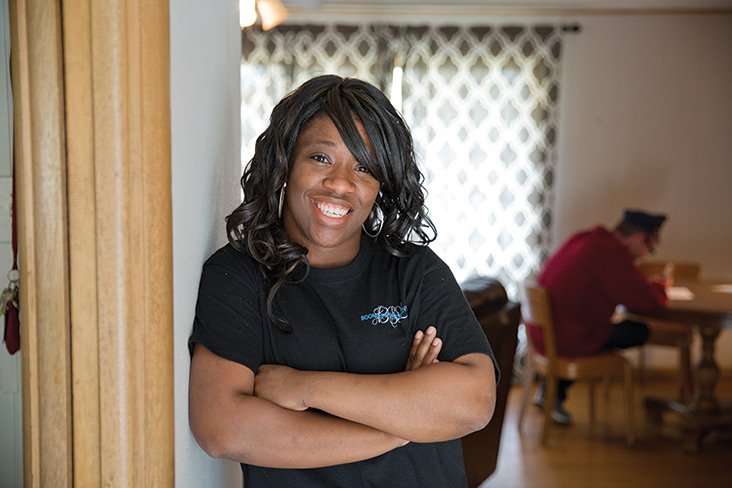Family Addition

ISL providers create ordinary lives for extraordinary people.
Photos by Anthony Jinson
“Tay, can I show him my room?” Kevin directs his question to Vashante Vinyard, the house manager who lives in the home’s basement apartment with her two children. Vashante says yes, and Kevin and I start our tour of his bedroom. Kevin tells me a story for every award he has been given, every piece of art he’s created, and every photo he’s displayed.
“Look, this is the chief of police. He’s [like] my dad.” He points out other pictures, one by one. Most of them are of his family, save a few autographed photos of celebrities. “See this picture? Do you know her? She’s famous. And this lady, you see her on TV She signed this one for me.”
Vashante informs me Kevin is a celebrity in his own right. “Everywhere we go in his hometown, people know Kevin,” she says. “Everyone says hi to him and wants to talk to him.”

Kevin Griffin wasn’t homeless, but his mother was homebound and his father had passed away. Having a developmental disability and a personality that caused him to be hyperactive with everything and everyone, Kevin needed a caregiver to protect him from the risk of roaming his small town, being vulnerable to abuse, and getting into bad situations. Today, he lives in Columbia in an individual supported living home provided by Boone Supported Living.
Individual supported living, or ISL, is an arrangement for adults who require support due to a developmental disability. ISL participants live in local homes or apartments where staff are available to help them experience a full, productive life as defined by each participant. Staff provide services based on an individual needs, respecting their preferences while also ensuring their health and safety. The support gives ISL participants the freedom to pursue their own interests, express their individuality, and actively participate in their communities.

Provision of Services
According to the Missouri Department of Mental Health, there are 22 ISL providers in Boone County. The largest provider among them is Woodhaven, which is currently supporting 110 adults living in 49 homes and apartments. Boone Supported Living supports 10 adults living in four homes.
ISL is funded through the Missouri Department of Mental Health, and any Boone County resident with a diagnosed developmental disability can become eligible to receive it. To qualify, a support coordinator must complete an assessment with the individual and his or her family, which results in a score used to prioritize services to be provided. The support coordinator then refers the individual and his or her family to all possible providers who can meet their specific needs.
There’s never enough funding to support everyone, though, and providers are often full. When that happens, ISL qualifiers are placed on the Department of Mental Health’s consumer referral database. When providers have an opening, they consult this database to find an individual who will be a good match for the ISL home. The provider extends an offer, which the participant may choose not to accept, to provide them with ISL services.
Boone Supported Living, Woodhaven, and other providers in Boone County operate under a supported living model of three-person homes. This model is popular mostly because what defines a dwelling as a group home or an ISL arrangement is determined by a combination of the Department of Mental Health standards and local zoning codes. More important, the model works well in accommodating transportation needs and allowing each person to have their own bedroom and, often, their own bathroom. There are other models as well — Woodhaven, for example, has many high functioning individuals not requiring 24/7 supervision who prefer to live in one-bedroom apartments by themselves. In this ISL model, residents are watched over and assisted by a staff member who lives in their same complex.

Daily Life
As Kevin’s ISL house manager, Vashante coordinates and manages the operation of the home, helping Kevin and his roommate structure their days and making sure each of them has whatever help they need for personal hygiene, preparing meals, completing household chores, building social skills, and managing their finances. Her days begin with helping Kevin get ready for work, which may involve her prompting him about time management and tasks on his to-do list. She coaches him as he prepares his lunch, making sure his choices result in a balanced meal, then takes him to his part-time job at Cedar Creek Resort, near Millersburg.
“I mow yards or clean cabinets,” Kevin says. “I feed the horses and turtles and fish. I rent cabins out to people.” Usually, he works full days with great success. Other days, he may confront an issue requiring him to call on Vashante so she can coach him through it over the phone.
When Kevin’s not working, his propensity for action and socialization keeps the Boone Supported Living staff busy taking him to events, activities, and programs that interest him. He has friends whom he visits and who visit him. (He received two phone calls from friends while we were talking.) When he’s not out socially, Kevin has things to do at home. He has chores, of course, and other responsibilities. There’s a video game console in the living room and a pool table downstairs. If his roommate doesn’t want to play, Vashante’s children are likely to join in. “My kids love Kevin and his roommate as if they were their uncles,” Vashante says. “My daughter is trying to teach Kevin how to read. Sometimes we take Kevin to the library with us.”
Vashante’s role as a house manager is a 40-hour, 7:00 a.m. to 3:00 p.m. job. Other support staffers come into the home to fill the evening and overnight shifts, which gives her time to be with her family. Not surprisingly, she includes Kevin among that family. It isn’t because she is unable to keep clear boundaries between the job and her personal life; she simply finds her work and life mix well together. “The relationships and bonds that we build with these guys — they’ve become family,” she says. “Their goals and things they try to accomplish become a fabric of you. And, as I experience things, I wonder how I can better help them accomplish the same.”
A trip to the library, a place at the Thanksgiving table, bowling with the in-laws, celebrating a graduation — these things aren’t unusual for ISL participants to experience with their caregiver’s families. Julie Walden, the founder and CEO, says “We don’t hire employees — we just add to the family.” When you operate a company dedicated to creating a home and sense of family for those without, you often can’t help but adopt the people you serve. This is the heart of Boone Supported Living and Woodhaven, along with other ISL providers. They extend a quality of life that only a family can produce.
Mark Palmer, CEO of Woodhaven, reiterates the practice’s importance. “Since we’re taking care of people, providing the least restrictive environment for them, it produces a family atmosphere because we are serving those folks in their home.”

Breaking Through
All ISL agencies, big and small, face the same challenges. There’s federal and state funding to consider — home services for people with disabilities faced controversial budget cuts this year — along with mental health regulations, operating costs, and local policy. And then there’s the grunt work: the process of securing homes, maintaining them, and filling them with clients. ISL providers dispense a lot of energy and time, make sacrifices most of us would not, and rarely, if ever, see wage growth. So why do they do it?
ISL providers do what they do for people like Kevin, to add to their beauty. They take in individuals who are often devalued and help them succeed within a place they can be seen and known. They do it so Kevin can have the same thing we all want — to be a part of the community we all share. They create ordinary lives for extraordinary people.


